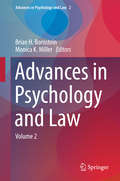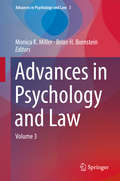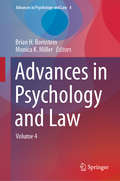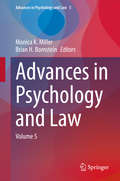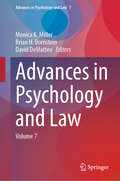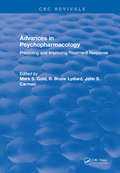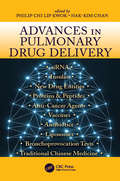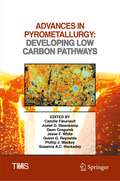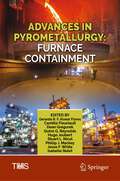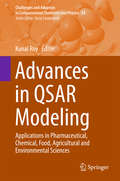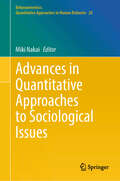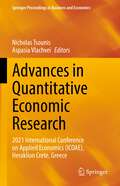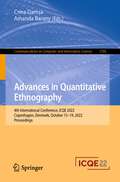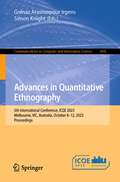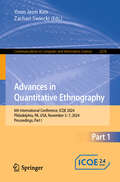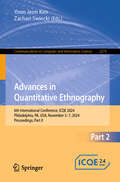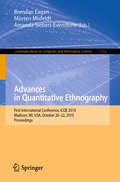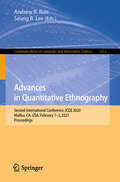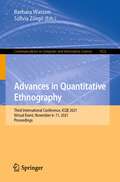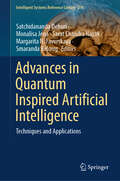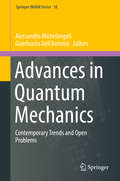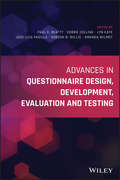- Table View
- List View
Advances in Psychology and Law: Volume 2 (Advances in Psychology and Law #2)
by Brian H. Bornstein Monica K. MillerAs with its esteemed predecessor, this timely volume offers ways of applying psychological knowledge to address pressing concerns in legal procedures and potentially to reduce criminal offending. In such areas as interrogations, expert testimony, evidence admissibility, and the "death qualification" process in capital trials, contributors offer scientific bases for trends in suspect, witness, and juror behavior and identify those practices liable to impinge on just outcomes. Recommendations span a wide range of research, practice, and policy areas, from better approaches to assessment to innovative strategies for reducing recidivism. The interdisciplinary perspectives of these chapters shed salient light on both the reach of the issues and possibilities for intervening to improve the functioning of the justice system. Among the topics covered: #65533; The validity of pleading guilty. #65533; The impact of emotions on juror judgments and decision making. #65533; The content, purpose, and effects of expert testimony on interrogation practices and suspect confessions. #65533; A synthetic perspective on the own-race bias in eyewitness identification. #65533; Risk-reducing interventions for justice-involved individuals. #65533; Criminal justice and psychological perspectives on deterring gangs. As a means to spur research and discussion, and to inspire further collaboration between the fields, Volume 2 of Advances in Psychology and Law will interest and intrigue researchers and practitioners in law-psychology as well as practicing attorneys, trial consultants, and clinical psychologists.
Advances in Psychology and Law: Volume 3 (Advances in Psychology and Law #3)
by Brian H. Bornstein Monica K. MillerThe latest entry in this noteworthy series continues its focus on psychological issues relating to legal and judicial matters, with sound recommendations for situational and system-wide improvement. Salient concerns are described both in areas where their existence is frequently acknowledged (juror impartiality, the juvenile justice system) and where they are rarely considered (Miranda warnings, forensic mental health experts). Authors describe differences between professional and lay concepts of justice principles--and the resulting disconnect between community sentiment and the law. Throughout these chapters, psychological nuances and their legal implications are made clear as they relate to lawyers, jurors, suspects, and victims. Included among the topics: · From the headlines to the jury room: an examination of the impact of pretrial publicity on jurors and juries. · Victim impact statements in capital sentencing: 25 years post-Payne. · Psychology and the Fourth Amendment. · Examining the presenting characteristics, short-term effects, and long-term outcomes associated with system-involved youths. · Indigenous youth crime: an international perspective. · An empirical analysis of law-psychology journals: who’s publishing and on what? As with the others in the series, this third volume of Advances in Psychology and Law will interest researchers in legal psychology and related disciplines (e.g., criminal justice) as well as practicing attorneys, trial consultants, and clinical psychologists.
Advances in Psychology and Law: Volume 4
by Brian H. Bornstein Monica K. MillerThe present volume consists of up-to-date review articles on topics relevant to psychology and law, and will be of current interest to the field. Notably, the majority of these topics are currently attracting a great deal of research and public policy attention in the U.S. and elsewhere, as evidenced by programs at the American Psychology-Law Society and related conferences. Topics for the present volume include: attitudes toward the police (Cole et al.), alibis (Charman et al.), hate crimes based on gender and sexual orientation (Plumm & Leighton), the role of gender at trial (Livingston et al.), neuroimages in court (Glen), intimate partner violence (Mauer & Reppucci), post-identification feedback (Douglass & Smalarz) and individual differences in eyewitness identification (Snowden & Bornstein), veterans’ wellbeing (Berthelot & Prager), and plea bargaining (Levett).
Advances in Psychology and Law: Volume 5 (Advances in Psychology and Law #5)
by Brian H. Bornstein Monica K. MillerThis volume consists of up-to-date review articles on topics relevant to psychology and law, and will be of current interest to the field. These topics are currently attracting a great deal of research and public policy attention in the U.S. and elsewhere and will be relevant to researchers, clinical practitioners, and policy makers. Topics include: attitudes toward police (Cole et al.), accuracy of memory for child sexual abuse (Goldfarb et al.), the use of interpreters in investigations (Goodman-Delahunty et al.), adjustment of former prisoners post-exoneration (Kirshenbaum et al.), psychological implications for gun policy (Pirelli et al.), ability to match people with images from ID cards and video (Rumschik et al.), judicial instructions on eyewitness evidence (Skalon et al.), social science of the death penalty (West et al.), and informant testimony (Wetmore et al.).
Advances in Psychology and Law: Volume 7 (Advances in Psychology and Law #7)
by Brian H. Bornstein Monica K. Miller David DeMatteoThis book delivers a comprehensive examination of contemporary issues at the intersection of psychology and law, reflecting the latest advancements and research in these critical fields. Authored by leading experts, it offers in-depth insights into key topics, including police use of force, hate crimes, and forensic assessments, making it an essential resource for practitioners, researchers, and policymakers. Key highlights include: The impact of psychological research on legal processes and decision-making. Current trends in understanding and addressing police use of force. Insights into the rising prevalence and complexity of hate crimes. This book's authoritative content, grounded in the latest empirical evidence, makes it indispensable for professionals in psychology, law, criminal justice, and public policy. It's also a valuable tool for educators and students aiming to stay abreast of the rapidly evolving landscape of forensic psychology.
Advances in Psychopharmacology: Improving Treatment Response
by Mark S. GoldThe book focuses on the prediction and optimization of pharmacological treatment of psychiatric patients. Topics covered include the importance of accurate psychiatric diagnosis, medical problems which can mimic psychiatric illness, and the interface between psychiatric illness and opiate addiction and alcoholism. Current literature on predicting responses to antidepressants, lithium, antipsychotics and antianxiety agents is summarized. This practical guide also offers details on the state-of-the-art uses of blood levels in psychiatric practice for each class of drugs as well as other useful information in tables, graphs and flow charts.
Advances in Pulmonary Drug Delivery
by PHILIP CHI LIP KWOK AND HAK-KIM CHANThe respiratory tract has been used to deliver biologically active chemicals into the human body for centuries. However, the lungs are complex in their anatomy and physiology, which poses challenges to drug delivery. Inhaled formulations are generally more sophisticated than those for oral and parenteral administration. Pulmonary drug development is therefore a highly specialized area because of its many unique issues and challenges. Rapid progress is being made and offers novel solutions to existing treatment problems. Advances in Pulmonary Drug Delivery highlights the latest developments in this field.
Advances in Pulmonary Medicine: Research and Innovations (Advances in Experimental Medicine and Biology #1160)
by Mieczyslaw PokorskiThis book discusses a wide range of investigations and practice-oriented advances in pulmonary medicine and critical care. Pulmonary diseases are a major cause of hospitalization and mortality, affecting millions of people worldwide. Addressing a range of topics, including chronic obstructive pulmonary disease, sleep apnea, and lung cancer, the book offers insights into the disease mechanisms and risk factors, along with practical aspects concerning the maintenance of quality of life, adherence to therapy, and palliative treatment and care. Further, it explores diagnostic and treatment approaches to respiratory dysfunction and respiratory failure, highlighting the beneficial effects of good sleep quality in chronic pulmonary conditions and lung transplant patients. The book also presents novel experimental research on the cellular voltage-gated sodium channels in the mechanism of pathological cough, which is particularly relevant for future targeted antitussive therapy. Lastly, it addresses the epidemiological aspects of pulmonary infections. As such, this book is a valuable resource for medical scholars, clinicians, family physicians, and other professionals seeking to improve the management of respiratory diseases.
Advances in Pyrometallurgy: Developing Low Carbon Pathways (The Minerals, Metals & Materials Series)
by Dean Gregurek Camille Fleuriault Jesse F. White Joalet D. Steenkamp Quinn G. Reynolds Phillip J. Mackey Susanna A.C. HockadayCarbon intensive industries are at a crossroads. Long-term manufacturing plans using pyrometallurgical processes all include decarbonization levers: we must solve the problem of fossil-based reduction and fossil-based power generation processes for metals production. This collection explores innovative and diverse strategies for the enablement of low carbon industries in the high-temperature metals and materials processing fields. In particular, the following processes are investigated:· Electrolysis and electrification of metallurgical processes · High-temperature electrolytic routes for metal and alloy production · Use of hydrogen and other alternative non-carbonaceous reducing agents · Biofuels and other non-fossil reagents for metallurgical applications · Direct and indirect use of solar energy in high-temperature processing · Energy efficiency and waste heat recovery concepts applied to pyrometallurgical operations
Advances in Pyrometallurgy: Furnace Containment (The Minerals, Metals & Materials Series)
by Dean Gregurek Camille Fleuriault Jesse F. White Quinn G. Reynolds Hugo Joubert Phillip J. Mackey Gerardo R. F. Alvear Flores Stuart L. Nicol Isabelle NoletThis collection explores the methods and challenges of containing corrosive and abrasive materials at extreme temperatures, whether they are used across commodities or technology specific. There is much to be learned from cross-commodity and cross-technology perspectives and this collection creates a platform for the exchange of ideas on the challenges, solutions, failures, and successes in furnace containment designs and applications while bringing together perspectives from industry, design houses, and research institutions. Topics include, but are not limited to: · Advances in furnace lining design philosophies · Advances in furnace design configurations and other design considerations · Problems experienced and their solutions implemented during construction and commissioning · Integration of new concepts into old smelters · Back to basics: refractory materials, shells, and cooling systems · Maintaining and monitoring · Process control and slag design · Lessons learned
Advances in QSAR Modeling: Applications in Pharmaceutical, Chemical, Food, Agricultural and Environmental Sciences (Challenges and Advances in Computational Chemistry and Physics #24)
by Kunal RoyThe book covers theoretical background and methodology as well as all current applications of Quantitative Structure-Activity Relationships (QSAR). Written by an international group of recognized researchers, this edited volume discusses applications of QSAR in multiple disciplines such as chemistry, pharmacy, environmental and agricultural sciences addressing data gaps and modern regulatory requirements. Additionally, the applications of QSAR in food science and nanoscience have been included - two areas which have only recently been able to exploit this versatile tool. This timely addition to the series is aimed at graduate students, academics and industrial scientists interested in the latest advances and applications of QSAR.
Advances in Quantitative Approaches to Sociological Issues (Behaviormetrics: Quantitative Approaches to Human Behavior #20)
by Miki NakaiThis edited book is the first one in English that demonstrates the innovative use of cutting-edge statistical methods for sociological and social science data. Unlike books that focus solely on applying quantitative methods to sociological and social science data, this book includes in-depth methodological discussions that highlight the interplay between sociological theory and data analysis. With expertise in sociology, psychology, social statistics, and survey methods and data collection, researchers in quantitative social science have developed extended, improved methods such as multivariate statistical analysis, survey methods, cluster analysis, multidimensional scaling, correspondence analysis, latent state model, network analysis, and other means tailored for cross-sectional, longitudinal, compositional, and network data to contribute to solving society's greatest challenges. The purpose of the book is twofold. One is to represent studies focusing on new directions in statistical analysis of sociological and social science data. These new directions may include novel theoretical paradigms, developing topical areas of research, innovative methodologies, and/or substantive findings that explore social processes. The other is to offer the most appropriate models and methods for explaining social phenomena and their underlying structures with the goal of discovering useful information, drawing conclusions, and supporting decision-making. The methodological discussions empower researchers to make informed decisions about research design, data collection, and analysis, enhancing the quality and validity of their sociological inquiries.
Advances in Quantitative Economic Research: 2021 International Conference on Applied Economics (ICOAE), Heraklion Crete, Greece (Springer Proceedings in Business and Economics)
by Nicholas Tsounis Aspasia VlachveiThis volume presents advanced quantitative methods and applications in economics with special interest in macroeconomics, microeconomics, financial economics, international economics, agricultural economics, and marketing and management. Featuring selected contributions from the 2021 International Conference of Applied Economics (ICOAE 2021) held in Heraklion Crete, Greece, this book provides country specific studies with potential applications in economic policy.
Advances in Quantitative Ethnography: 4th International Conference, ICQE 2022, Copenhagen, Denmark, October 15–19, 2022, Proceedings (Communications in Computer and Information Science #1785)
by Crina Damşa Amanda BaranyThis book constitutes the refereed proceedings of the 4th International Conference on Advances in Quantitative Ethnography, ICQE 2022, held in Copenhagen, Denmark, during October 15–19, 2022.The 29 full papers included in this book were carefully reviewed and selected from 71 submissions. They were organized in topical sections as follows: QE Theory and Methodology Research; Applications in Education Contexts; and Applications in Interdisciplinary Contexts.
Advances in Quantitative Ethnography: 5th International Conference, ICQE 2023, Melbourne, VIC, Australia, October 8–12, 2023, Proceedings (Communications in Computer and Information Science #1895)
by Golnaz Arastoopour Irgens Simon KnightThis book constitutes the refereed proceedings of the 5th International Conference on Advances in Quantitative Ethnography, ICQE 2023, held in Melbourne, VIC, Australia, during October 8–12, 2023.The 33 full papers included in this book were carefully reviewed and selected from 39 submissions. They were organized in topical sections as follows: understanding learners and learning; society, culture, identity, and justice; and advances in QE methodologies.
Advances in Quantitative Ethnography: 6th International Conference, ICQE 2024, Philadelphia, PA, USA, November 3-7, 2024, Proceedings, Part I (Communications in Computer and Information Science #2278)
by Yoon Jeon Kim Zachari SwieckiThis two-volume set CCIS 2278-2279 constitutes the refereed proceedings of the 6th International Conference on Advances in Quantitative Ethnography, ICQE 2024, held in Philadelphia, PA, USA, during November 3-7, 2024. The 31 full papers and 10 short papers included in this book were carefully reviewed and selected from 82 submissions. They are organized in the following topical sections: Theory and Methods; Teaching and Learning; and Cultural Discourse.
Advances in Quantitative Ethnography: 6th International Conference, ICQE 2024, Philadelphia, PA, USA, November 3-7, 2024, Proceedings, Part II (Communications in Computer and Information Science #2279)
by Yoon Jeon Kim Zachari SwieckiThis two-volume set CCIS 2278-2279 constitutes the refereed proceedings of the 6th International Conference on Advances in Quantitative Ethnography, ICQE 2024, held in Philadelphia, PA, USA, during November 3-7, 2024. The 31 full papers and 10 short papers included in this book were carefully reviewed and selected from 82 submissions. They are organized in the following topical sections: Theory and Methods; Teaching and Learning; and Cultural Discourse.
Advances in Quantitative Ethnography: First International Conference, ICQE 2019, Madison, WI, USA, October 20–22, 2019, Proceedings (Communications in Computer and Information Science #1112)
by Brendan Eagan Morten Misfeldt Amanda Siebert-EvenstoneThis book constitutes the refereed proceedings of the First International Conference on Quantitative Ethnography, ICQE 2019, held in Madison, Wisconsin, USA, in October 2019. It consists of 23 full and 9 short carefully reviewed papers selected from 52 submissions. The contributions come from a diverse range of fields and perspectives, including learning analytics, history, and systems engineering, all attempting to understand the breadth of human behavior using quantitative ethnographic approaches.
Advances in Quantitative Ethnography: Second International Conference, ICQE 2020, Malibu, CA, USA, February 1-3, 2021, Proceedings (Communications in Computer and Information Science #1312)
by Andrew R. Ruis Seung B. LeeThis book constitutes the refereed proceedings of the Second International Conference on Quantitative Ethnography, ICQE 2020, held in February 2021. Due to the COVID-19 pandemic the conference has been postponed to 2021 and was held in online format. The 28 full papers were selected from 56 submissions. The contributions in this volume come from diverse fields and perspectives, and present the studies on advantages of using quantitative ethnography methods and techniques in a number of different domains and contexts, including ethnography and statistics, human interpretation and machine processing, etc.
Advances in Quantitative Ethnography: Third International Conference, ICQE 2021, Virtual Event, November 6–11, 2021, Proceedings (Communications in Computer and Information Science #1522)
by Barbara Wasson Szilvia ZörgőThis book constitutes the refereed proceedings of the Third International Conference on Quantitative Ethnography, ICQE 2021, held in November 2021. Due to the COVID-19 pandemic the conference was held online. The 26 full papers were selected from the 60 submissions. The contributions in this volume come from diverse fields and perspectives, and present the studies on advantages of using quantitative ethnography methods and techniques in a number of different domains and contexts, including ethnography and statistics, human interpretation and machine processing, etc.
Advances in Quantum Inspired Artificial Intelligence: Techniques and Applications (Intelligent Systems Reference Library #274)
by Satchidananda Dehuri Margarita N. Favorskaya Smaranda Belciug Monalisa Jena Sarat Chandra NayakThis book advances the artificial intelligence techniques by strongly inspired from quantum computing. Quantum computing (QC), rooted in the mysterious principles of quantum mechanics, has fascinated scientists, researchers, and visionaries for a long time. Its potential lies in changing how we compute, moving from classical bits to quantum bits (qubits), and unlocking incredible processing capabilities. At the same time, artificial intelligence (AI) has been on a trajectory of rapid advancement, with deep learning becoming proficient at tasks that were once deemed impossible. At this juncture, integrating these two fields through various means can play a pivotal role to bring a technological revolution.
Advances in Quantum Mechanics: Contemporary Trends and Open Problems (Springer INdAM Series #18)
by Alessandro Michelangeli Gianfausto Dell’antonioThis volume collects recent contributions on the contemporary trends in the mathematics of quantum mechanics, and more specifically in mathematical problems arising in quantum many-body dynamics, quantum graph theory, cold atoms, unitary gases, with particular emphasis on the developments of the specific mathematical tools needed, including: linear and non-linear Schr#65533;dinger equations, topological invariants, non-commutative geometry, resonances and operator extension theory, among others. Most of contributors are international leading experts or respected young researchers in mathematical physics, PDE, and operator theory. All their material is the fruit of recent studies that have already become a reference in the community. Offering a unified perspective of the mathematics of quantum mechanics, it is a valuable resource for researchers in the field.
Advances in Quantum Methods and Applications in Chemistry, Physics, and Biology (Progress in Theoretical Chemistry and Physics #27)
by Jean Maruani Erkki J. Brändas Gerardo Delgado-Barrio Matti HotokkaAdvances in Quantum Methods and Applications in Chemistry, Physics, and Biology includes peer-reviewed contributions based on carefully selected presentations given at the 17th International Workshop on Quantum Systems in Chemistry, Physics, and Biology. New trends and state-of-the-art developments in the quantum theory of atomic and molecular systems, and condensed matter (including biological systems and nanostructures) are described by academics of international distinction.
Advances in Quantum Systems in Chemistry, Physics, and Biology: Selected Proceedings of QSCP-XXIII (Kruger Park, South Africa, September 2018) (Progress in Theoretical Chemistry and Physics #32)
by Jean Maruani Liliana Mammino Davide Ceresoli Erkki BrändasThis edited, multi-author book gathers selected, peer-reviewed contributions based on papers presented at the 23rd International Workshop on Quantum Systems in Chemistry, Physics, and Biology (QSCP-XXIII), held in Mopani Camp, The Kruger National Park, South Africa, in September 2018. The content is primarily intended for scholars, researchers, and graduate students working at universities and scientific institutes who are interested in the structure, properties, dynamics, and spectroscopy of atoms, molecules, biological systems, and condensed matter.
Advances in Questionnaire Design, Development, Evaluation and Testing
by Debbie Collins Gordon B. Willis Jose-Luis Padilla Paul C. Beatty Lyn Kaye AmandaWilmotA new and updated definitive resource for survey questionnaire testing and evaluation Building on the success of the first Questionnaire Development, Evaluation, and Testing (QDET) conference in 2002, this book brings together leading papers from the Second International Conference on Questionnaire Design, Development, Evaluation, and Testing (QDET2) held in 2016. The volume assesses the current state of the art and science of QDET; examines the importance of methodological attention to the questionnaire in the present world of information collection; and ponders how the QDET field can anticipate new trends and directions as information needs and data collection methods continue to evolve. Featuring contributions from international experts in survey methodology, Advances in Questionnaire Design, Development, Evaluation and Testing includes latest insights on question characteristics, usability testing, web probing, and other pretesting approaches, as well as: Recent developments in the design and evaluation of digital and self-administered surveys Strategies for comparing and combining questionnaire evaluation methods Approaches for cross-cultural and cross-national questionnaire development New data sources and methodological innovations during the last 15 years Case studies and practical applications Advances in Questionnaire Design, Development, Evaluation and Testing serves as a forum to prepare researchers to meet the next generation of challenges, making it an excellent resource for researchers and practitioners in government, academia, and the private sector.
